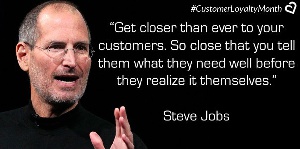Dear Readers, for the past two weeks I have identified the benefits of relationship banking and how the little things bankers do for their customers can go a long way to retain and make them advocates. Since banking is about delighting the customer, bankers are being reminded to go back to basics to ensure that every customer, literate or illiterate, feels comfortable enough to stay with their banks. After all, there is nothing as delightful as a caring bank. Today, I will concentrate on how Relationship Managers can make their key accounts assist in turning the fortunes of their banks around. This does not mean that other smaller accounts are unimportant.
Relationship Management of Key Accounts
A key account is one of your most important customers with whom it is crucial to develop and maintain an added value relationship to improve your business.
Banks categorise or segment their customers into various groups for various reasons. I am sure you will agree that some customers, by their sheer size and complexity, demand additional time to meet their desired expectations.
Account holders who demand extra time and monitoring, mostly due to their type of business operations, are usually charged more and therefore contribute more to a bank’s bottom-line.
Savings and personal account holders are fairly easy to manage as compared to business account holders, groups of companies, conglomerates and multi-national companies. One key point is that despite the differences, all customers must be treated fairly.
Key accounts are the consistent high revenue producers (remember 20 percent of your customers probably produce 80 percent of your revenue). They also offer opportunities to increase sales/revenue and are strategically important industry or market leaders. They also offer reduced sales costs, because it is cheaper to grow your business with existing customers than to deploy a sales force to find and secure new ones.
Why a key account is different
Your key account customers differ from your other customers in many ways. Your competitors are constantly trying to win them away from you. In the case of corporate accounts, you may find that there are multiple decision-makers and other staff who might influence the company’s business relationship with your bank. It is especially important to understand your key account’s business.
The Expectations of a Key account holder
Their expectations are huge! Some of them are very financially sophisticated and expect ‘an arm and a leg’ from you. After all, they know their worth to your bank. Your key account will expect you to be the main link into your bank for all issues; understand its business, market needs and competitive environment; help sell them products/services that achieve their business objectives; and add value to the business relationship with your bank by, for example, acting as a consultant on issues not directly related to your main business. Last but not least, they always expect you to act with integrity and in a professional manner. I want to emphasise the last point….Act with integrity and in a professional manner.
The Expectations of Your Bank
From your bank’s perspective, every RM is expected to understand all aspects of the key account’s business, proactively develop more business with the customer, establish strong relationships with the decision-makers in your customer’s organisation, build wide awareness of the bank’s capabilities throughout the key account, handle the key account in a professional manner on a day-to-day basis, and develop a true business partnership with the key account. Once again, the integrity and professionalism aspect is highlighted.
The Relationship Manager in a Dilemma!
This is a tall order! As an RM, you are to be the customer’s ‘Friend’. Sometimes they demand outrageous exchange rates for their foreign currency during international trade transactions. During the negotiations, many RMs find themselves being asked by the bank’s management staff: “Are you for the customer or for the bank?” Meanwhile, your customer is also threatening to take the transaction to another bank to be effected!
This dilemma is very common and can put RMs under stress. Woe betide you if you lose a key account holder to a competitor! Blame-game, warnings, and sometimes poor appraisal from the supervisor. That is why RMs need to know the customers’ business, the competition and its external environments, and regularly send brief call-reports to management for an appreciation of the customers’ stand and find solutions to withstand any shock from their decisions.
How to Increase Your Influence
The key to successful relationship management is increasing your influence with the decision-maker in your key account. To do this, you must find out who’s who in the decision-making process, understand the ‘internal politics’ in your customer’s organisation, the network in the key account – and so become familiar with the whole organisation.
One thing an RM should never do is to think that apart from main customer, the CEO, Board Chairman etc., nobody else matters in the company. Let me share a true story. A young lady RM dealt only with the Managing Director of a company. She never bothered to know the General Manager, Finance Manager, Sales and Operations Managers. The other management staff were also key decision-makers who exerted great influence in the company’s decisions.
She had the rudest shock of her life when she realised that the company had started sending most of their sales proceeds to a competitor. Apparently they were not satisfied with the way the bank’s branch was handling their operational account. Returned cheques were not being advised, some SMS messages did not pop up, causing inconsistencies in their balances on their Internet banking platform. They felt the RM did not respect them and had therefore managed to convince the CEO to try another bank!
This means that the RM did not even bother to learn how the company’s account was faring, neither did she attempt to know the other executives to cross-sell other products like Executive loans, salary loans etc. to the staff. For such products, you need to know the Finance Manager, Head of HR, Production Manager – not forgetting the Executive of their Local Union. The union leaders are very influential in mobilising the general staff to meet the bankers for a Sales lecture. They sometimes become your bank’s advocates, so please do not underestimate their influence.
Strategic Planning for Decision-making
Find out who within your key account is the Decision-maker who signs-off on all strategies and deals. This varies depending on who you talk to, so ask a few different people within the organisation “Who makes the final decision?” and then decide yourself. Develop a rapport with this person if you can. There are some ‘influencers’ in the company. They influence the decision-maker and have expertise in a particular area – finance, strategy, operations, information technology etc., and therefore give valued inputs to the decision-maker.
Dear RM, make sure this person is on your side. In your interaction with other management staff, some may feed you with non-confidential information on what is happening within the company and might suggest business development ideas to you. On the other hand, there are ‘Against’ staff – so watch out! They prefer your competitor’s products to yours…there is one in every company. Try to develop at least a neutral relationship with this person.
The Politics in Your Customer’s Organisation
As a human institution, your customer’s business is your business. Don’t feel that you are being too intrusive. A good Relationship Manager, in a bid to know the customer’s business, may detect some sort of politics within the organisation and know how to tread cautiously. I remember the case of a senior RM who during a working visit to a key account’s factory met agitated staff, grouped together on the verge of starting a demonstration at the front of the factory.
They were threatening to report certain unethical practices within the company to government. Since the account had benefited from a big credit facility from the bank, the RM – who was on good terms with some of the staff – engaged their leaders in an informal discussion that eventually ended successfully, with the management staff promising to rectify the anomalies.
Apparently, the senior RM played a critical role and sometimes gave advisory services to the CEO and earned a lot of respect. The strike could have caused losses to the business and obviously a default in the loan repayment schedule. This may be an extreme case, but when an RM listens to the grapevine news certain sensitive information may emerge which can give the bank a heads-up during decision-making, and also gain it a competitive edge.
I will pause here. Next week I will share more examples of practical cases where Relationship Managers can use great skills to ensure long-term and sustainable business development through profitable partnerships with strategically important customers.
Click to view details



Business News of Monday, 25 June 2018
Source: thebftonline.com

















